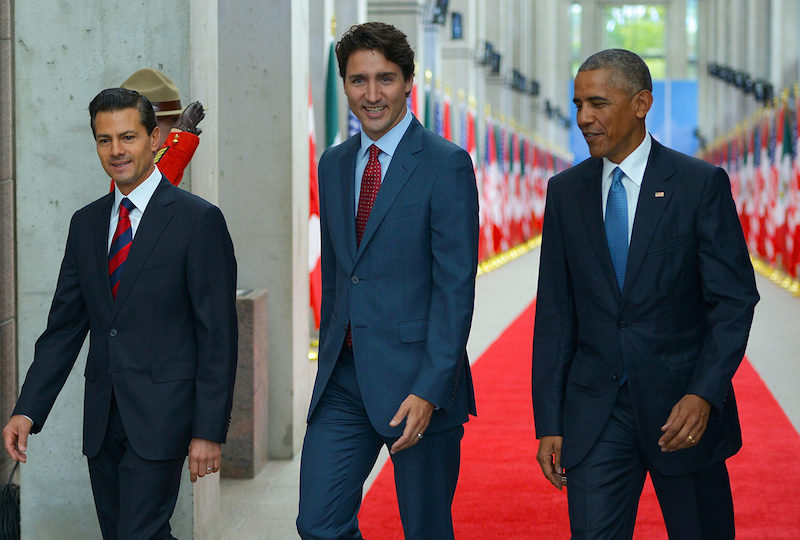Like this article? rabble is reader-supported journalism. Chip in to keep stories like these coming.
The decision of British voters to leave Europe has been treated as evidence that they’re intolerant xenophobes keen to seal themselves off from the world. That Donald Trump is on their side only helps make the case that they represent a boorish throwback, a desire to make the English-speaking world great again by turning it into a giant gated community surrounded by sky-high walls.
Having such a collection of bigots and boors opposing “globalization” may turn out to be a boon for those promoting globalization — that is, the laws that govern the global economy.
This is unfortunate, since these laws — and the international trade deals that enforce them — have delivered benefits almost exclusively to those at the top in recent years, and should be thoroughly overhauled.
But with Neanderthal wall-builders lurking in the background, it may be easier for the Trudeau government to convince Canadians to accept these badly flawed and increasingly unpopular trade deals as part of living in an open, modern world.
U.S. President Barack Obama helped make this case in his address to Parliament last week, urging us to resist “sealing ourselves off from the world,” as he derided opposition to foreigners and opposition to international trade deals with the same broad brush.
But whoa, Nelly! Let’s not lump Trump’s scurrilous Muslim ban in with legitimate resistance to trade deals such as NAFTA, as well as the highly contentious new Trans-Pacific Partnership (TPP), the sweeping 12-nation trade deal Obama is keenly promoting.
There’s a litany of reasons why any sensible person would resist these trade deals.
But the most outrageous aspect of them has always been the special set of legal rights they bestow on foreign corporations and investors. These rights — which go beyond anything that exists in domestic or international law — enable wealthy foreigners to sue governments over policies the foreigners don’t like, and to have their lawsuits decided by closed tribunals.
The TPP, rather than removing this indefensible, anti-democratic set of rights for wealthy foreigners, actually extends them.
Indeed, the TPP could open a floodgate of new claims by wealthy foreigners, according to a powerful report by Osgoode Hall law professor Gus Van Harten, released last month but ignored by the media.
“With the TPP, many more such claims will become possible,” notes Van Harten, an expert in international law and investment treaties.
The report documents how corporations and wealthy investors have taken advantage of the bizarrely generous legal rights available to them under NAFTA, suing Canada 39 times and winning more than $190 million in compensation from Canadian taxpayers. There is no cap on how high the compensation can be, and the vast majority of it goes to the ultra-rich — corporations with annual revenues over $1 billion and individuals with net wealth above $100 million.
Oh, and let’s not forget what it is these foreign interests are objecting to: laws passed by democratically elected governments to protect the public. For instance, Philip Morris challenged anti-tobacco regulations in Australia, Lone Pine Resources challenged fracking regulations in Canada. Just last month, TransCanada sued the United States for $15 billion to compensate for Obama’s decision not to approve the Keystone pipeline.
And the cases are decided by private sector lawyers acting as arbitrators. Unlike regular judges, these arbitrators, paid exorbitant hourly rates, have a direct financial interest in encouraging foreign investors to bring claims and to stretch them out, and have so far earned “well over $1 billion in fees,” Van Harten says.
OK, so the TPP offers sweetheart legal protection for some of the richest people on Earth, making it easy for them to sue us for uncapped amounts, in closed tribunals adjudicated by lawyers with a financial interest in siding with the rich foreigners.
But surely there’s also got to be something in the TPP for foreign banks?
Yes, there is: the TPP goes beyond NAFTA in creating new opportunities for foreign banks to sue for compensation. Who would have thought of that!
Last February, Trade Minister Chrystia Freeland flew to New Zealand to sign the TPP. While Canada still must ratify the deal, Freeland sure sounded keen as she told reporters “we are a party that believes in trade, and a government that believes in free trade.”
The Trudeau government will no doubt fill us with dark Brexit and Trumpian images to warm us up to the TPP. But not even revulsion for Donald Trump will provide enough lipstick to pretty up this pig.
Linda McQuaig is a journalist and author. Her most recent book (with Neil Brooks) is The Trouble with Billionaires: How the Super-Rich Hijacked the World and How We Can Take It Back. This column originally appeared in the Toronto Star.
Photo: Presidencia de la República Mexicana/flickr
Like this article? rabble is reader-supported journalism. Chip in to keep stories like these coming.



